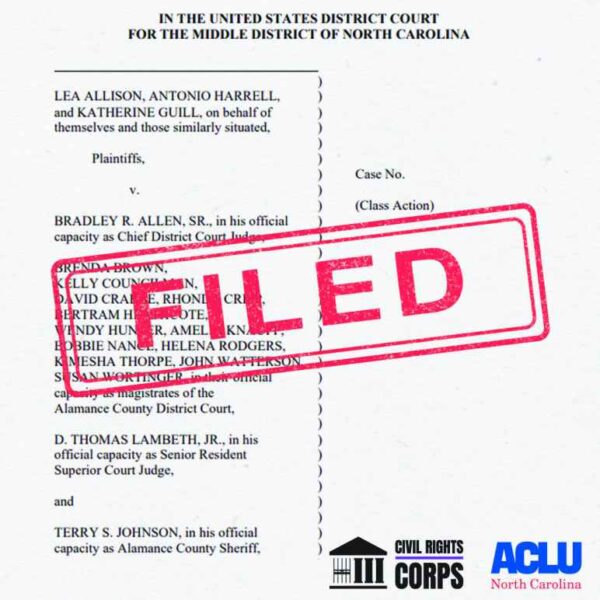GRAHAM, N.C. - Civil rights groups today filed a federal class-action lawsuit against court officials in Alamance County, North Carolina, for violating the constitutional rights of people who are presumed innocent but are confined to jail because they cannot afford to pay bail following their arrest. The lawsuit seeks an overhaul of Alamance County’s unconstitutional cash bail system that the groups say discriminates against poor people, locking them up because they cannot afford to pay for their freedom while allowing those who have money to go home.
The American Civil Liberties Union, ACLU of North Carolina, and Civil Rights Corps filed the lawsuit, on behalf of three people incarcerated in the Alamance County jail who cannot afford to pay the bail amount set by a magistrate with no consideration of their ability to pay, and no attorney provided during bail setting. Filed in the U.S. District Court for the Middle District of North Carolina, the lawsuit asks the court to declare Alamance County’s bail practices unconstitutional and to ensure that no one is held in the county jail only because they are unable to pay their bail.
“A person’s freedom should never depend on how much money they have,” said Leah Kang, a staff attorney for the ACLU of North Carolina. “But right now in Alamance County, people who are presumed innocent are sitting in jail for one simple reason: because they do not have enough money to pay the bail that would allow them to go home to their jobs and families while they wait for their day in court. This unjust cash bail system violates people’s rights, has a devastating impact on communities, and must end.”
The lawsuit describes a two-tiered legal system in which a person’s freedom depends on their ability to afford bail, a clear violation of due process and equal protection. The lawsuit also claims violations of the right to counsel because poor people accused of crimes are not provided attorneys to represent them when bail is being set.
“For Alamance County's poorest residents, detention prior to trial is the norm. Their poverty means they will be detained in the Alamance County jail for days or even weeks before they can request a bail reduction or alternative conditions of release,” said Katherine Hubbard, an attorney with Civil Rights Corps. “During these days of detention, they miss work, struggle to communicate with friends and family, and contemplate pleading guilty just to get out and return to their lives. Meanwhile, those who have access to enough cash to pay for their freedom are released. This wealth-based system is blatantly unconstitutional and has no place in a country that purports all people are equal under the law.”
“The reforms we seek go beyond money bail. Every person accused of a crime in Alamance County should be represented by a qualified defense attorney whenever a judge sets bail. A skilled lawyer is critical to ensuring that people are released outright instead of being wrongfully detained on cash bail,” said Twyla Carter, senior staff attorney with the ACLU's Criminal Law Reform Project. “Detention should be the exception, not the rule and a system where a person’s freedom depends on how much money they have is a broken one.”
Background:
Nearly 90 percent of all people charged with crimes in Alamance County are issued a secured bond -- one of the highest rates in the state. Typically, magistrates set those monetary conditions for a person’s release without any knowledge or inquiry of a person’s ability to pay. For those who cannot afford to pay, the requirement to pay cash bail operates as a de facto detention order, the lawsuit argues.
In Alamance County, once bail is set by the magistrate, the only way for individuals to challenge the unattainable bail set in their case is to file a motion for bond reduction. Because individuals who cannot afford to pay their bond also usually cannot afford their own lawyer, this means they have to wait until a district court judge appoints them counsel for their first opportunity to have their bail reconsidered. Under state law, people charged with felonies can wait up to 96 hours (4 days) before their first appearance. For people who are charged with misdemeanors in Alamance County but cannot afford to pay their bail, the wait can be even longer as they are often jailed for days or weeks, and sometimes a month or more, before they see a judge or are appointed an attorney.
Research is clear that with each day in jail, the chance for a fair trial diminishes as it is tougher to mount a defense when behind bars. Pretrial detention is the single greatest predictor of a conviction and a sentence to jail or prison time. It is also more likely that the person will plead guilty, even when innocent, just to go home. Just three days behind bars puts a person at risk of losing their job, home, and custody of their children.
